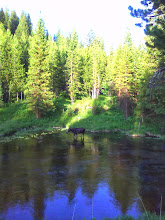Wilson High School, where I teach, is preparing a production of The Wizard of Oz, which is--I think--the greatest live-action children's movie in history.
Every morning my wife and I wake up singing the songs, and every morning we comment on how we are not tired of the songs yet--a sign that the songs are very good.
The play is based on the 1939 MGM film, with some portions of the script that were cut from the film, and some additional post-modern schtick. (The play version was written in 1987 for the Royal Shakespeare Company, too soon to benefit from the death of post-modernism and the playwright's need to answer all those nagging questions like, "What happened to Miss Gultch?" and "Where did the Winkies come from and why do they sing that song?") The music utilizes not only the Harold Arlen and Yip Harburg songs from the film, but the thematic elements from Herbert Stothart's masterful score. (What would Oz be without the witch's theme? I ask you.)
I have had a couple of opportunities lately to talk to my students about why I think the Oz music is so good, and part of my answer is that it doesn't dumb itself down at all for the sensibilities of little children. It is adult, sophisticated, and accessible to children all at once.
Think of "Over the Rainbow." The melody covers an octave and a third; so many of today's melodies are simple diatonic chants--if there are melodies at all in modern popular music. The harmonies of the A portion of the chorus change tonic three times, and are full of rich harmonic extensions and dissonant suspensions, finally resolving on a 6th (for the unmusical among you, that's halfway between major and minor; or, in other words, halfway between happy and sad).
The lyrics are brilliant in their combination of childhood simplicity and adult complexity: "Some day I"ll wish upon a star [an oft-repeated childhood phrase] and wake up where the clouds are far behind me [an ambiguous idea that could be anything from the safety of heaven to death]." The verse (usually omitted) speaks of "clouds...darken[ing] up the skyway," which is possible in the best of times, but takes on additional significance when one realizes that two Jews wrote it in 1938. It is practically a national lament, "If happy little bluebirds fly beyond the rainbow, why, oh, why can't I?"
I personally love the playful rhymes of the triptych "If I Only Had a Brain/Heart/Nerve": "I would not be just a nuffin,/ My head all full of stuffin'," "When a man's an empty kettle,/ He should be on his mettle" (how often do you get puns like that--the "metal" man should be on his "mettle," or show his worth/courage--in lyrics nowadays?), and "I would show the dinosaurus/ Who's king around the fores'."
"The Jitterbug" was cut from the film to save time and because it was too much of its age for timeless Oz. Now, 75 years later, it fits perfectly, and that's good. It is loud, dissonant, big-band jazz at its best.
When children's theater or children's films succeed today, they succeed on the same terms, I think. First, they are not dumbed down. Second, they do not stint in quality simply because they are made for a younger audience. And, third, they are understood on multiple levels that continue to enrich the viewer throughout adulthood.
Sunday, March 9, 2014
"The Wizard of Oz" and its right to endure
Labels:
" stage musical,
"The Wizard of Oz,
children's film,
children's theater,
film,
harmony,
lyrics,
melody,
music,
songs
Subscribe to:
Post Comments (Atom)

No comments:
Post a Comment